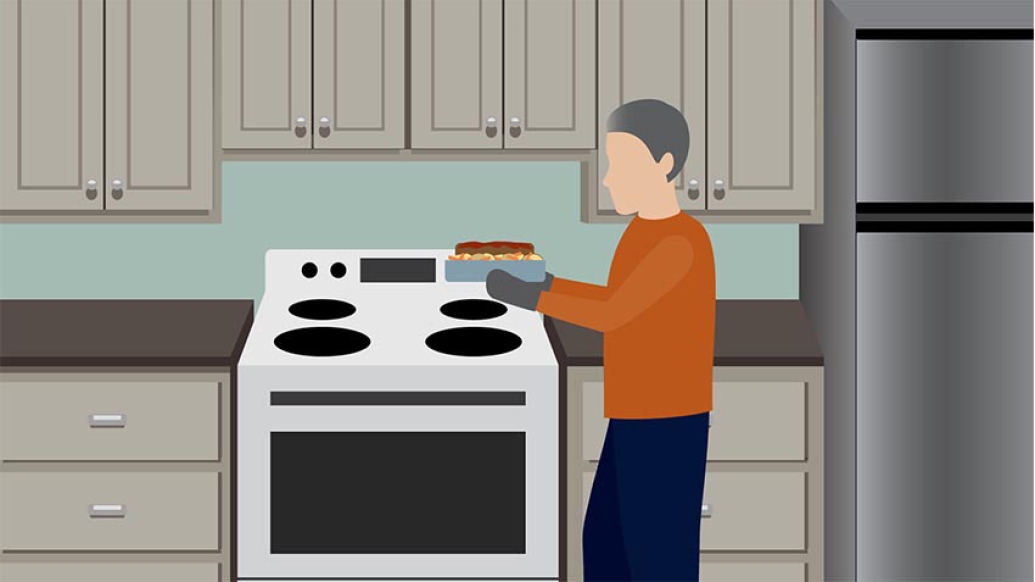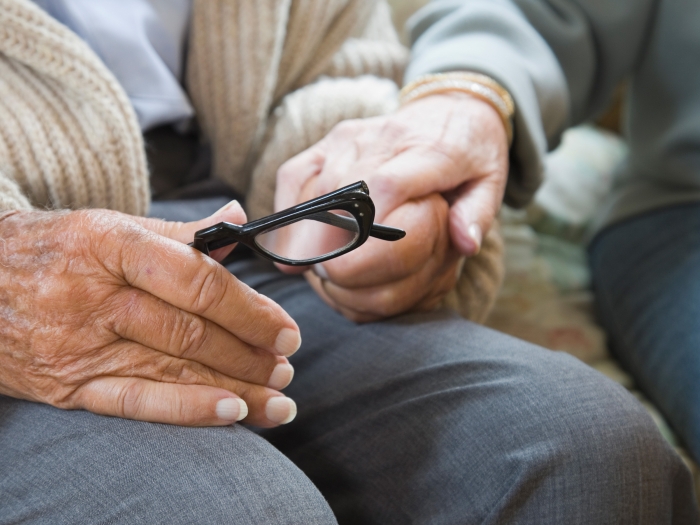Few shopped for groceries online, and self-rating of healthy eating was higher among those who dined alone or at restaurants least, national poll finds
1:35 PM
Author |

Most people in their 50s and older were capable home cooks just before COVID-19 struck America, but only 5% had ordered groceries online, according to a new national poll.
The cooking skills that enabled half of older adults to eat dinner at home six or seven days a week may have served them well during the height of the pandemic, the poll suggests. However, they may need added support for grocery shopping as the pandemic continues and older adults seek to avoid COVID-19.
Those who cooked dinner at home the most often before the pandemic were most likely to rate the overall health of their diet as excellent or very good. And those who said their physical health was excellent or very good were the most likely to say they were confident in their cooking skills or enjoyed cooking.
But the poll also shows vulnerability for many older adults. One in four said they already ate most or all of their meals alone, even before the pandemic led to social distancing rules. Solo diners reported less healthy diets than those who rarely or never ate alone.
SEE ALSO: Even Before COVID-19, Many Adults Lacked Stable Food Supply
In addition, 11% of older adults ate fast food three times a week or more. This group was less likely to call their overall diet healthy.
A baseline of knowledge
The new results come from the National Poll on Healthy Aging, carried out by the University of Michigan Institute for Healthcare Policy and Innovation with support from AARP and Michigan Medicine, U-M's academic medical center. It involved a national sample of more than 2,000 adults aged 50 to 80.
The data provide a baseline understanding of the food shopping, cooking and dining out habits of older Americans just a few months before COVID-19 arrived. It was taken before the pandemic changed guidance about going to the grocery store, closed most sit down restaurants and altered everything from incomes to social gatherings. AARP is doing new polling to explore the pandemic's effects on food-related habits.
"Public health guidance to avoid infection will continue to alter food-buying habits for many older people and those with health conditions, so further support for them may be needed to ensure healthy habits continue," says Julia Wolfson, Ph.D., M.P.P., an assistant professor of health management and policy at the U-M School of Public Health, who worked on the poll. "That could include more assistance with online ordering for no-contact pickup or delivery."
Dining out, eating together
The temporary closure of sit-down restaurants would have affected half of those polled, who said they dined out at least once in the week before they took the poll. Eleven percent had eaten in such restaurants three or more times in the last week.
SEE ALSO: Many Older Adults, Especially Those with Health Issues, Feel Isolated
"As restaurants begin to reopen for dining in or carry-out, the less-healthy options may beckon for those who have been cooking almost entirely at home," says Cindy Leung, Sc.D., M.P.H., an assistant professor of nutritional sciences at the U-M School of Public Health. "Restaurants could help support healthy eating by making sure affordable healthy options are available on menus and making sure nutrition information is transparent and easily available."
Meanwhile, pandemic-related income disruptions from lost jobs or retirement investment losses may mean fewer restaurant meals for many. This makes less expensive home cooking options, and food support such as federal "food stamp" SNAP benefits, Meals on Wheels and food pantries more important. The NPHA team recently reported on the cost-related food insecurity already experienced by many older adults before the pandemic.
SEE ALSO: Seeking Medical Care During COVID-19
It may also increase reliance on lower-cost, but less nutritious, fast food. Past research has shown that people who eat fast food often have lower quality of diet overall and higher rates of diet-linked health conditions such as obesity, diabetes, high blood pressure and some cancers.
Poll director Preeti Malani, M.D., who has training in both infectious diseases and geriatrics, notes that the new poll also intersects with the NPHA's past findings about loneliness and isolation among older adults.
As friends and family cautiously begin to gather with older adults, we should do so with a focus not just on preventing infection, but also on supporting healthier eating habits for everyone.Preeti Malani, M.D.
"As people begin to have small gatherings, social isolation might ease for those who have been living and eating alone all spring," she says. "But as friends and family cautiously begin to gather with older adults, we should do so with a focus not just on preventing infection, but also on supporting healthier eating habits for everyone."
Looking to the future
Even as the intensity of the pandemic eases, at least for now, the continued attention to avoiding infection will be a focus for many older adults, who are most at risk of serious or fatal cases of COVID-19. That's why AARP is continuing to explore the shopping and dining habits of adults over 50, with new polling that is expected to be released this summer.
SEE ALSO: Keeping Our Patients Safe During COVID-19
"This poll reveals that many adults 50 and older enjoyed eating out pre-pandemic. As restaurants reopen around the country, AARP recommends that Americans follow public health guidelines to stay protected, particularly at-risk older adults," says Alison Bryant, Ph.D., senior vice president of research for AARP. "We look forward to results from our ongoing research to see how older adults may have changed their eating habits and behaviors during this crisis."
The National Poll on Healthy Aging results are based on responses from a nationally representative sample of 2,048 adults aged 50 to 80 who answered a wide range of questions online. Questions were written, and data interpreted and compiled, by the IHPI team. Laptops and Internet access were provided to poll respondents who did not already have them.
Paper cited: University of Michigan National Poll on Healthy Aging, June 2020.

Explore a variety of healthcare news & stories by visiting the Health Lab home page for more articles.

Department of Communication at Michigan Medicine
Want top health & research news weekly? Sign up for Health Lab’s newsletters today!





